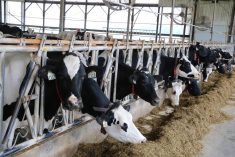The federal government will spend $75 million during the next few years to implement the 57 recommendations from special investigator Sheila Weatherill for preventing listeria and improving food safety.
“We are making significant investments to hire more inspectors, update technologies and protocols and improve communication so that Canadians have the information they need to protect their families,” Agriculture Minister Gerry Ritz told a news media briefing. Weatherill’s report “pulled no punches. It showed we need to collaborate more with other levels of government and bring in cutting-edge science.”
Read Also

Mazergroup’s Bob Mazer dies
Mazergroup’s Bob Mazer, who helped grow his family’s company into a string of farm equipment dealerships and the main dealer for New Holland machinery in Saskatchewan and Manitoba, died July 6 from cancer.
While Weatherill’s main job was to review Ottawa’s handling of last year’s listeria outbreak, the government’s response will strengthen its ability to deal with other foodborne illness as well, Ritz said. “Food safety is more than listeria. We have to work at reducing all pathogens.”
The government will hire 166 new food safety staff of which 70 positions will go to the Canadian Food Inspection Agency to beef up its front line meat inspection staff, he said. The rest will be shared among CFIA, Public Health Agency of Canada and Health Canada to create risk assessment and emergency response teams, improve coordination with provincial agencies and communication with the public, create a national surveillance system for tracking foodborne illnesses and augment laboratory staff.
The government is in the process of hiring a team of third-party auditors to determine what the proper workloads for food inspectors should be and to make sure CFIA’s Compliance Verification System (CVS) for meat companies works properly, Ritz said. “We expect to get the results of this exercise by the new year.” Weatherill recommended the audit in her report in July because the level of inspection issue was too complex for her group to get to the bottom of and still meet its deadline.
Back in March, the government ordered meat companies to report any finding of listeria to the CFIA. This was part of its initial response to last year’s outbreak of listeria in deli meats from Maple Leaf Foods that left 22 dead and more than 50 seriously ill. Ritz says food safety systems have to be geared to catching problems before they reach the public.
Under CVS, meat companies are supposed to inspect their products under an international standard known as HACCP (hazard analysis critical control points) with CFIA checking they’re doing the job properly. The union representing CFIA’s meat insepectors says CVS has spread the Agency’s inspection staff too thin. Ritz said the additional inspectors will fill any gaps plus allow CFIA to fully train its staff on CVS procedures. He said the number of new inspectors could be increased if the third-party audit recommends it.
The government also plans to better inform the public about who’s most vulnerable to foodborne illnesses, he noted. It will also establish a food safety website.
The national surveillance system will “improve rapid identification and tracking of potential foodborne illness outbreaks,” the federal announcement said. Federal and provincial laboratories will be beefed up so they can respond faster to signs of illnesses and help track the sources of any outbreaks.

















